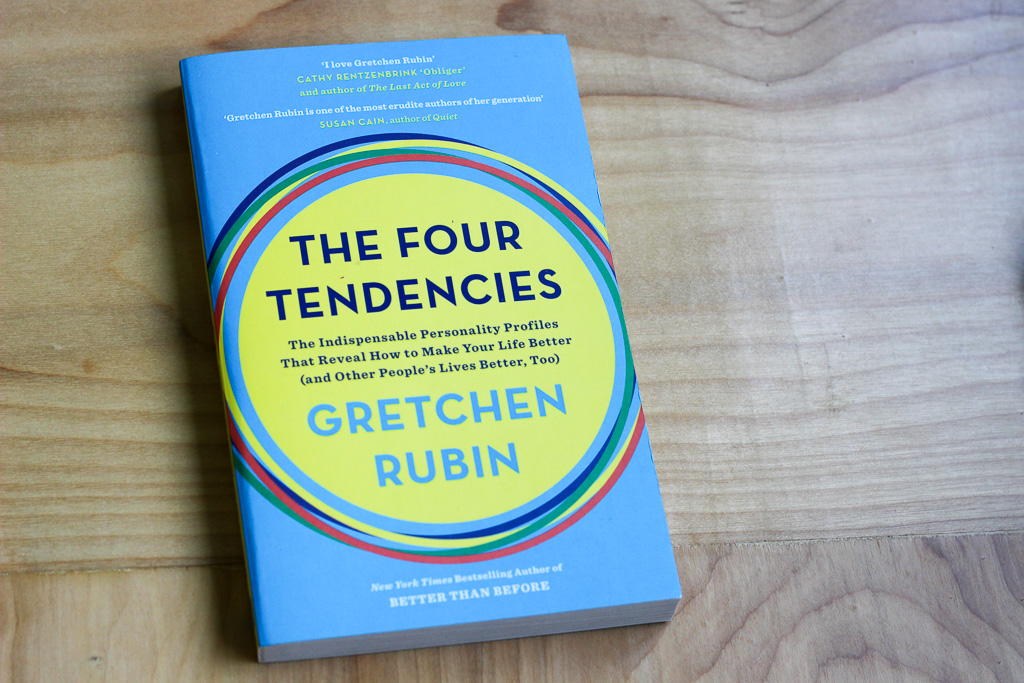
It’s time for a book review from one of our lovely teachers, Lindsay!

If you want to make change in your habits, see insight to your past and current behaviors, and more effectively understand and communicate with others, you should definitely read this book!
How are the Four Tendencies different from other personality types classifications (like Myers Briggs or Enneagram)? Gretchen developed a framework that answers the question: How do you respond to expectations? In other words, what makes you act, or not act. The reason this insight into how you respond to expectations is so important, is that it directly impacts what you DO and don’t DO.
Expectations come from two sources: outer expectations (what your boss assigns you) and inner expectations (your New Year’s Resolution). Whether you meet them or you fail at them depends on your Tendency. The Four Tendencies are: Upholder, Questioner, Obliger, and Rebel.
Quick Breakdown:
Upholders readily meet both outer and inner expectations with ease. They love rules and love planning (think Hermione Granger).
Questioners resist outer expectations but meet inner expectations. (They won’t do it because you told them to, they’ll ask why and comply if it makes sense for them.)
Obligers meet outer expectations but resist inner expectations. We love doing things for others but can’t ever seem to find time for ourselves. (Sound familiar? I said “we” because I fall into this category, and so do most, as this Tendency holds the largest percentage of people.)
Rebels resist both inner and outer expectations. They don’t ask why, but rather say “you can’t make me!” or they may be intrigued to actually do the opposite of what external sources ask.
What I learned:
As an Obliger, learning I need outer accountability to meet the inner expectations that I so often struggle with was a huge lightbulb moment for me. For example, say you have a personal goal to practice in studio 4x/week. Gretchen suggests that an Obliger like me would show up for someone else, but not myself (She’s absolutely right!). So, what do I do? Deliberately create outer expectations where there are none. An idea could be taking my friend’s yoga mat home with me after class and scheduling our next practice together. If I don’t show up, my friend can’t practice, and I would never want to be responsible for my friend not being able to get her sweat on (remember, Obligers are people pleasers), so I show up. Get it?!
This circumstance will only work for Obligers, because remember; Upholders and Questioners have no problem meeting inner expectations. Upholders want to work out, so they do. Questioners believe the why and have proof from how they feel after class. Rebels are like “you can’t make me practice more!” (They need to be tricked into thinking it’s their idea.) However, a Rebel may want to prove someone (even themselves wrong) “I’m not flexible, so I can’t do yoga, therefore I am going to show you by getting more flexible!”
After reading this book, I can empathize BIG TIME with my fellow Obligers and make strides to meeting personal goals by creating outer accountability for myself. I also learned techniques for effectively communicating to all Four Tendencies. Gretchen does a fabulous job speaking specifically to how spouses can speak to spouses, doctors to patients, teachers to students, and parents to children. Keep in mind, each Tendency responds differently to outer and inner expectations, which means “speaking to the whole” is speaking to All. Four. Tendencies. There is also a hilarious section in the book on signage, and how it’s possible to succeed or drastically fail to speaking to all Four Tendencies in a simple sign (you know, the one that someone left on the break room microwave telling you to keep it clean).
Curious about the Four Tendencies? Love taking online quizzes? You can take the quiz online here and it is also available in the book (which we have for sale at all three studios!) 😉
If you are super nerdy like me, and this stuff gets you RIDICULOUSLY EXCITED, consider signing up for next month’s 40 Days: Funky Buddha Style, where we will delve into The Four Tendencies, and lots of other similarly fascinating tools.
The 40 Days Curriculum includes:
- Yoga Practice
- Fun yoga tips, tricks, & drills
- An introduction to the science of meditation
- Skill building to develop a meditation and home yoga practice
- Journaling & self-inquiry
But, best of all, you’ll learn and practice specific and clear tools to better understand yourself. What better way to start 2018?
—Linds







